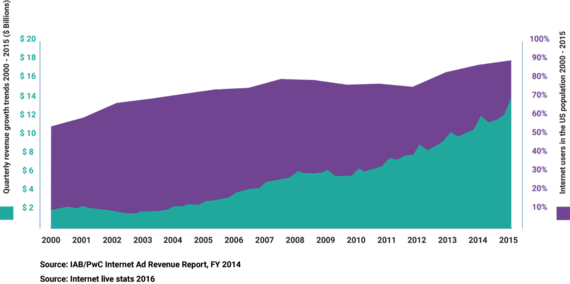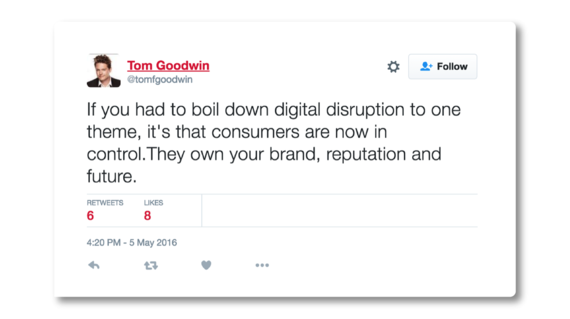Brands need to market their products and services, so that people like you and me will buy them. What changes with time is the way in which we market these products and the way in which consumers then buy them. Many factors influence this change like technology, trends, and consumers themselves.
Take digital marketing, for instance. As the amount of people accessing the internet has grown we've seen a rush of brands push their marketing spend into digital channels, all looking for new ways to get their content in front of the right audience at the right time. Brands are still marketing, in the hopes that people will buy - we're just changing the way we're doing it to keep up with consumer trends.
If we simply look at the rise in online advertising spend over the last decade, the change is clear. Headlines like 'Interpublic to Shift $250 Million in TV Ad Spending to YouTube' are becoming more and more common. Budgets are shifting towards digital and the graph below proves it.
The purple area indicates the growth of internet users in the US, the green area indicates the rise in digital advertising spend.
As marketers, we look to the future, hedging our bets (and our careers) on what we think the next evolution of marketing will be. I'm betting on P2C Marketing. Why? Because I believe online marketing will see the continued rise, and budget shift, towards P2C marketing.
P2C marketing is where a person - usually an influencer - shares a brand's message directly with a consumer. It's Person to Consumer marketing, and it's the evolution of B2C (that is, a brand or business sharing a message directly with a consumer).
Now that we have all the acronyms out of the way lets try and understand why more P2C marketing is on the horizon. The logic is simple. People don't really want to talk to brands, they want to talk to people. They go onto Facebook, Twitter and Snapchat every day because they want to interact with people.
So the first reason we'll see a continued shift to P2C is because deep down inside, if we're really honest with ourselves, we know that people don't really want to talk to brands, they want to talk to people.
The second reason I believe P2C marketing is the future is because we're starting to see a shift in behaviour from the giants. From the social networks themselves.
Social networks are repositioning for P2C. This month, both Facebook and Google have revised their policies to better position themselves as part of the P2C ecosystem. Twitter will probably follow soon, but it tends to be a bit late to the party with these things. (Sorry Twitter, but it's true).
Having explained why I think we're evolving to a P2C marketing space, it's also important to highlight some of the challenges we face. I've been involved in the Influencer Marketing space for the last two years, and it's been great to see the adoption and hype around working with influencers. There are already million-dollar transactions happening between brands and influencers, and every day we see new influencers captivating their audiences across social channels like YouTube, Instagram and Snapchat with their fresh takes on branded content.
What we need to see more of in the next 18 months is education: why to work with influencers, how to work with influencers and what value they can bring to brands. If marketers have the tools and knowledge to ensure their strategies tick all the right boxes, we'll end up with campaigns that add more value to not only to the brands we work with, but to the influencer and their audience as well.
I recently wrote an eBook to contribute to the education gap, and it's a great place to start if you're new to the space. One of the key chapters highlights the importance of a marketer's role in the P2C ecosystem, and it's probably not what you think it is.
Your job as a marketer is not to write the content for the influencer, but rather to write an effective brief that will allow the influencer to understand your message, and share it in the most meaningful way.
I'll give you a second to take that in.
Whether we like it or not, the marketing industry is seeing a consumer-driven shift towards P2C. If those people are talking about a great piece of branded content and it's the right fit, at the right time, then consumers are far less likely to scroll past, feeling disconnected.
I'll give you a real-life example. At Webfluential we invest most of our media spend into an Invite & Earn programme where the influencers on our platform can invite others to join. They earn a fee for doing so. We managed to lower our cost per aquisition down by 40% just by shifting our media budget from B2C to P2C tactics. Why? Because people want to join a Influencer network that other people belong to, not one that we tell them to join.
Don't get me wrong. I'm not saying that sharing media and messaging through a brand's owned channels will die. I'm simply saying we'll be seeing a lot more P2C strategies integrated into overall campaigns.
As a marketer, put yourself in a consumer's shoes and ask: who would you rather talk to?
*Side note: P2C marketing has a few different definitions officially, but because none of them really took off i'm just claiming the acronym as People 2 Consumer marketing for the case of this article.



